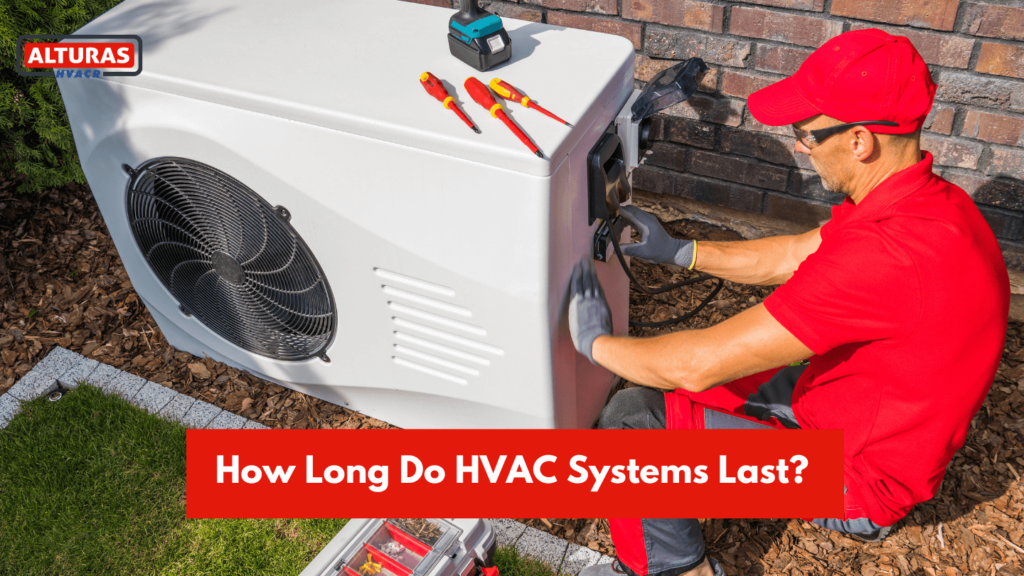Heating, Ventilation, and Air Conditioning (HVAC) systems are essential for maintaining a comfortable indoor environment. Knowing the typical lifespan of HVAC components can help you plan for maintenance and replacement, ensuring optimal performance and efficiency. This guide explores how long do HVAC systems last, offers tips to extend their lifespan, and explains when you should consider replacing your system. By understanding these aspects, you can make informed decisions about your HVAC system’s care and maintenance.
The Typical HVAC Life Spans
In general, most HVAC systems have a lifespan of 15 to 25 years. However, this estimate can vary significantly depending on the type of system and other contributing factors. Despite regular maintenance and repairs, even the highest quality boilers, furnaces, heat pumps, and air conditioners will eventually need to be replaced.HVAC systems consist of several critical components, each with its own expected lifespan. Proper HVAC maintenance and timely repairs can significantly impact their longevity.
How Long Does an Air Conditioner Last?
Air conditioners generally last between 15 to 20 years. The lifespan of an air conditioner depends on factors like usage, maintenance, and environmental conditions. Regular cleaning of filters, coils, and fins, as well as scheduling annual professional inspections, can help extend its lifespan. Additionally, ensuring the unit is not overworked and is appropriately sized for your home can prevent premature wear and tear.
For you:
How Long Does a Furnace Last?
Furnaces typically have a lifespan of 15 to 20 years, though this can vary based on the type and model. Gas furnaces tend to last slightly longer than electric ones. To maximize a furnace’s lifespan, perform regular maintenance, including changing filters, cleaning burners, and checking for leaks. Ensuring proper ventilation and addressing any issues promptly can help keep your furnace running efficiently for as long as possible.
Must Read:
How Long Do Boilers Last?
Boilers usually last between 10 to 15 years, but their lifespan can vary depending on the type (e.g., combi, system, or conventional boiler) and how well they are maintained. Regular boiler maintenance, flushing the system to remove sludge, checking for leaks, and ensuring proper pressure levels can extend a boiler’s life. Annual servicing by a professional is also essential to keep the boiler in good working condition.
How Long Do Refrigeration Systems Last?
Refrigeration systems, including commercial units and industrial systems, generally last around 10 to 15 years. The longevity of refrigeration systems depends on their usage and maintenance. Regularly cleaning coils, checking refrigerant levels, and ensuring proper airflow can help extend the life of these systems. Preventative maintenance of refrigeration system is crucial to avoid unexpected breakdowns and costly repairs.
How Long Do Heat Pumps Last?
Heat pumps typically last between 15 to 20 years, offering both heating and cooling capabilities. The lifespan of a heat pump can be influenced by factors such as usage, maintenance, and climate. Regularly replacing air filters, cleaning the heat pump (outdoor), and scheduling annual professional inspections can help maintain the efficiency and longevity of your heat pump.
Factors That Impact the Longevity of HVAC Systems
Several factors can impact the lifespan of HVAC systems:
- Maintenance: Regular maintenance is crucial for extending the life of HVAC components. Scheduled inspections and timely repairs help prevent issues from becoming major problems.
- Usage: The frequency and intensity of use can affect how long an HVAC system lasts. Overworking the system or using it excessively can lead to quicker wear and tear.
- Installation Quality: Proper installation is vital for optimal performance and longevity. Poor installation can lead to inefficiencies and premature failures.
- Environmental Conditions: Extreme temperatures, humidity, and exposure to environmental elements can impact the lifespan of HVAC systems. Protecting outdoor units from harsh conditions can help prolong their life.
- System Size: An appropriately sized system for your space ensures efficient operation and reduces strain on components. Oversized or undersized systems can lead to faster wear and tear.
When to Replace the HVAC System?
Replacing an HVAC system is a significant decision that several factors can influence:
- Age: Systems that are nearing the end of their expected lifespan may become less efficient and require frequent repairs. If your system is over 15 years old and showing signs of wear, it may be time to consider a replacement.
- Repair Costs: If repair costs are high and frequent, replacing the system might be more cost-effective in the long run. Consider the cost of repairs versus the cost of a new HVAC system.
- Efficiency: Older systems may be less energy-efficient compared to newer models. Upgrading to a more efficient system can reduce energy bills and improve comfort.
- Performance Issues: If your system struggles to maintain a comfortable temperature or experiences frequent breakdowns, it may be time for a replacement to ensure reliable performance.
How Your Local HVAC Contractor Can Help?
Your local HVAC contractor plays a crucial role in maintaining and replacing your system. They can:
- Assess System Health: Provide a thorough evaluation of your HVAC system’s condition and recommend necessary repairs or replacements.
- Offer Professional Advice: Help you choose the best system based on your needs, budget, and home characteristics.
- Ensure Proper Installation: Handle the installation of new systems, ensuring that all components are correctly set up and functioning optimally.
- Perform Maintenance: Offer regular maintenance services to keep your system running efficiently and extend its lifespan.
Conclusion
Understanding the typical lifespans of HVAC components and the factors that impact their longevity can help you make informed decisions about maintenance, repairs, and replacements. By staying proactive with regular maintenance and working with a qualified HVAC contractor, you can extend the life of your system and ensure optimal performance. Investing in your HVAC system’s care today can lead to a more comfortable and efficient home environment for years to come.
FAQs
What is the life expectancy of an HVAC system?
The life expectancy of an HVAC system varies by component, with air conditioners and heat pumps lasting 15 to 20 years, furnaces up to 20 years, boilers 10 to 15 years, and refrigeration systems around 10 to 15 years. Proper maintenance can help extend these lifespans.
How often do HVAC systems need to be replaced?
HVAC systems typically need to be replaced every 15 to 20 years, depending on the component and system maintenance. Factors such as efficiency, repair costs, and system performance can influence the timing of replacement.
Can an AC unit last 30 years?
While rare, an AC unit can last up to 30 years with exceptional maintenance and care. However, most air conditioners last between 15 to 20 years. Replacing an aging unit may improve efficiency and comfort.
Can HVAC last 40 years?
It is unlikely for most HVAC systems to last 40 years due to technological advancements and wear and tear. Most components have a typical lifespan of 10 to 20 years, with replacement recommended before reaching 40 years.
How long should an air conditioner compressor last?
An air conditioner compressor typically lasts between 10 to 15 years. Proper maintenance, such as cleaning and regular checks, can help prolong the life of the compressor and ensure efficient cooling performance.

